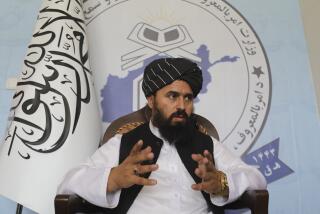Annan Asks Taliban to Reject ID Tags for Afghanistan Hindus
- Share via
UNITED NATIONS — U.N. Secretary-General Kofi Annan appealed to Afghanistan’s Taliban rulers on Wednesday to reject a proposal to mark all minority Hindus with yellow patches on their clothing, likening it to the persecution of Jews in Nazi Germany.
“Such an order would constitute a grave violation of human rights and recalls some of the most deplorable acts of discrimination in history,” Annan spokesman Fred Eckhard told a news conference here.
But the Taliban leaders said they would proceed with the plan, insisting it was designed for Hindus’ protection from religious harassment.
A Taliban representative in New York said the Hindus themselves asked to be distinguished from Muslims to avoid beatings by police who enforce Afghanistan’s Islamic laws.
“This proposal has been made by the Hindu minorities to the government so that the religious police would not bother them,” said Abdul Hakeem Mujahid, the Taliban’s U.S. liaison. “It is for their own protection so they could be recognized and not be bothered about the length of their beards or not heeding the call to prayer.”
The Taliban government’s Ministry for the Promotion of Virtue and Prevention of Vice has announced that it will order Afghanistan’s Hindus to identify themselves at all times by wearing a yellow piece of cloth on their shirt pockets.
Under the order, Hindu women in Afghanistan for the first time would be required to wear full-length burkas--dresses with hoods and veils--to comply with the Taliban’s interpretation of Islamic law, which calls for women to be covered from head to foot.
Afghanistan’s leaders have not made a decision on the plan, which was proposed by the Islamic Council of Scholars and must be approved by the Supreme Court before being declared law by the reclusive supreme leader, Mullah Mohammed Omar. The head of the religious police, Mullah Mohammed Wali, said Tuesday that the order would be implemented soon.
The Taliban spokesman in the U.S., however, said he thought the proposal would not make it into law. “I expect them to reject it in the first stage,” Mujahid said. “They can find other ways to provide security for the Hindus.”
Vikram Parekh, a Human Rights Watch researcher, said aid workers in Afghanistan are skeptical of the Taliban’s claims that Hindus asked to be singled out. Almost all of the country’s small Hindu and Sikh population, which once numbered about 50,000, has emigrated or taken refuge abroad. About 500 Hindus remain in Kabul, the capital, and about 1,000 more are scattered among three other cities. They tend to keep a low profile, Parekh said.
Apart from noisy demonstrations in India’s Hindu nationalist heartland, the Taliban’s latest edict did not stir much reaction in India. But a Foreign Ministry spokesman called the Taliban edict “another example of the Taliban’s obscurantist and racist ideology and completely alien to Afghan tradition.”
Until now, the Taliban largely had left members of the Hindu minority alone and allowed them to worship unhindered. But exiled Afghan dissident Rasool Amin predicted that few Afghan Hindus will be willing to wear labels that could mark them for attack by Muslim extremists.
“To my mind, it will be very hard for them to follow this restriction,” Amin, a former political science professor at Kabul University, said from Peshawar, Pakistan. “If they go out, it is not only risky, it is insulting. Some will violate the rule, and others will leave the country.”
The patches are reminiscent of the Star of David labels that Jews were forced to wear when Adolf Hitler’s Nazis began their pogrom in the 1930s, singling Jews out for attack, and later execution in death camps.
The Taliban’s religious police are frequently accused of beating and jailing alleged violators of numerous laws that regulate everyday life, such as the length of a man’s beard, which should be long enough to protrude from a fist held under the chin, or the need for women to be escorted by male relatives in public.
*
Farley reported from the United Nations and Watson from New Delhi. Siddartha Barua in The Times’ New Delhi Bureau contributed to this report.
More to Read
Sign up for Essential California
The most important California stories and recommendations in your inbox every morning.
You may occasionally receive promotional content from the Los Angeles Times.













